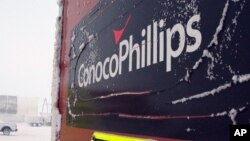A business delegation representing major U.S. companies visited Cambodia last week for two days of discussions where they met with Prime Minister Hun Sen and other senior government officials to discuss the challenges and opportunities of investing in the country.
The group was led by William G. Lafferrandre, vice president of Asia Pacific with ConocoPhillips and included members of the U.S.-Asean Business Council.
Lafferandre said during a meeting at the Peace Palace in Phnom Penh that included representatives of Coca Cola, Ford, General Electric, Herbalife, Procter & Gamble, RMA and Visa, that U.S. investors were committed to expanding investment in all sectors of Cambodia’s economy.
Lina Lim, a Coca-Cola spokesperson, said the businesses could raise concerns over the investment climate with the government.
“We can raise to the government what are our needs and how the government can help to attract investors from abroad to open business in these sectors.”
Lim added that more could be done to stimulate local suppliers.
“We still lack local suppliers. To solve this problem, it requires us, other private sector actors and the government to meet and discuss what resources are short and who in Cambodia can work on that area.”
The Coca-Cola Company employs 900 people in Cambodia, almost all of whom are Cambodians.
Data from the Council for the Development of Cambodia shows there was about $22.3 billion of private investment in Cambodia between 2011 and 2015.
Forty-five percent of that investment went into infrastructure development while about 35 percent went into industry.
Nay Chhiv Chhun, general manager of Herbalife Cambodia, said Cambodia had great potential to attract more foreign investment.
“It takes a while to establish infrastructure and build the right team of employees and, in our case, independent members.”
The Asian Development Bank estimates that the country will continue to grow at about 7 percent in 2016.
“Each Asean country is at a different level of development. Cambodia is our eighth market in the Asean region, but one where we see growth and a good demand for our quality nutrition products.”
Seng Voeung, general manager of Ford Cambodia, said he had briefed the council members about how changing competition was creating new challenges.
“We talked about the limitation of imports of thrift cars by limiting its year or set tax because in Asean countries, they don’t let thrift cars be imported. We also came across several problems of tax raises by the government recently.”
Despite the tax hikes, he said Ford Cambodia was seeing higher growth rates compared to other subsidiaries in the region.
The U.S. Business Mission 2016 seeks to strengthen ties between the government of Cambodia and private U.S. companies operating in Cambodia through increasing private sector engagement during policy making processes and understanding the challenges and opportunities facing Cambodia following the formation of the Asean Economic Community.
It also seeks to support the government of Cambodia to realize better governance and transparency while building effort in the fields of human resource development, corporate social responsibility, the training of small- and medium-sized enterprises, youth leadership and cultural exchange programs.







